Subaru Forester VS Toyota RAV4
In the competitive compact SUV segment, the Subaru Forester and Toyota RAV4 stand out for their exceptional versatility and reliability. The Forester's standard all-wheel drive and impressive off-road capability make it an ideal choice for adventure enthusiasts, while the RAV4 offers a more fuel-efficient hybrid option and a stylish, contemporary design. Both vehicles excel in practicality and safety features, making them top contenders for families and outdoor lovers alike.
Subaru Forester
The Subaru Forester is a versatile SUV known for its impressive off-road capabilities and practical design. With a spacious interior and advanced safety features, it offers comfort and security for both city driving and outdoor adventures. Its reliable performance and all-wheel-drive system make it a popular choice among those who appreciate a combination of functionality and rugged charm.
detailsToyota RAV4
The Toyota RAV4 stands out in the crowded SUV market with its distinct design, embodying a blend of robustness and style. Its cabin provides a harmonious fusion of comfort and practicality, offering plenty of space for both passengers and luggage. This vehicle is engineered to deliver a smooth driving experience, whether manoeuvring through city streets or exploring winding country roads.
detailsIn the growing market of compact SUVs, the battle between the Subaru Forester and the Toyota RAV4 has taken center stage. Both vehicles offer a blend of reliability, versatility, and performance, appealing to a wide range of customers. In this comparison, we will explore their technical aspects, innovations, and overall performance to help you decide which SUV reigns supreme.
Powertrain and Performance
The Subaru Forester is equipped with a 2.0L petrol MHEV engine, delivering a power output of 150 HP and generating a torque of 194 Nm. It features an automatic CVT transmission and an all-wheel-drive system, which enhances its capability on diverse terrains. With a 0-100 km/h acceleration time of 11.8 seconds, the Forester balances decent power with efficiency, achieving a fuel consumption of 8.1 L/100km.
On the other hand, the Toyota RAV4 presents a more robust lineup of engines, including a full hybrid and a plugin hybrid variant. The conventional full hybrid engine produces between 218 to 306 HP, depending on the configuration. Notably, the RAV4 can accelerate from 0-100 km/h in as quick as 6 seconds, showcasing its performance edge over the Forester in this aspect. Furthermore, the RAV4 boasts an impressive fuel consumption range of just 1 L/100km in its most efficient plugin hybrid variant, making it an economical choice for eco-conscious drivers.
Dimensions and Space
In terms of size, the Subaru Forester measures 4640 mm in length, 1815 mm in width, and stands at 1730 mm in height. It offers ample space, with a trunk capacity of 509 liters, enough for everyday needs and weekend adventures. With a curb weight ranging from 1658 kg to 1693 kg, it provides stability and safety without compromising on fuel efficiency.
The Toyota RAV4 slightly trails in length, measuring 4600 mm, but offers a broader width at 1855 mm and a slightly lower height of 1685 mm. Its trunk with a capacity of 580 liters proves advantageous for cargo space, especially for families. The RAV4's curb weight ranges from 1745 kg to 1910 kg, reflecting a different feel on the road but contributing to its performance dynamics.
Technological Innovations
Both SUVs come loaded with advanced technology, enhancing safety, comfort, and connectivity. The Subaru Forester integrates Subaru's EyeSight driver-assist technology, which provides features like adaptive cruise control, lane departure warning, and pre-collision braking. This focus on safety has earned it high ratings in crash tests.
Meanwhile, the Toyota RAV4 offers cutting-edge technology in its Toyota Safety Sense package, which includes automated emergency braking, lane tracing assist, and dynamic radar cruise control. The RAV4 also excels with its multimedia system, featuring a larger touchscreen display and seamless smartphone integration, making connectivity a breeze.
Environmental Impact
When discussing eco-friendliness, the RAV4's hybrid options take the lead. The RAV4's hybrids produce CO2 emissions as low as 22 g/km, showcasing Toyota’s commitment to reducing the environmental impact of their vehicles. The Forester, with a CO2 emission rating of 185 g/km, still offers good efficiency but lags behind in comparison to the RAV4 hybrids.
Conclusion: Which is Right for You?
Choosing between the Subaru Forester and the Toyota RAV4 ultimately depends on your priorities. The Forester stands out for its all-wheel-drive capabilities, excellent safety features, and spacious interior geared towards outdoor enthusiasts. However, the Toyota RAV4 seems to cater more to those who value hybrid efficiency, performance, and advanced technology.
Regardless of which vehicle you choose, both SUVs offer a dependable and enjoyable driving experience, backed by two of the best brands in the automotive market.
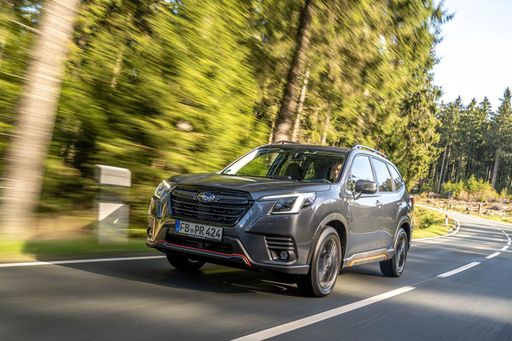 @ Subaru
@ Subaru
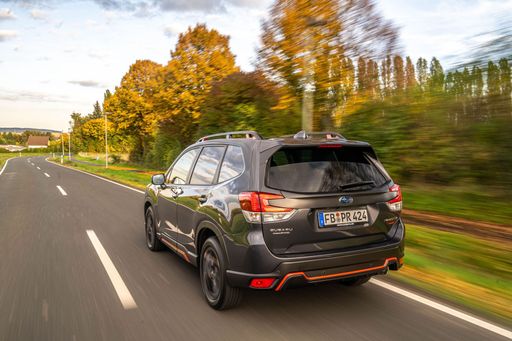 @ Subaru
@ Subaru
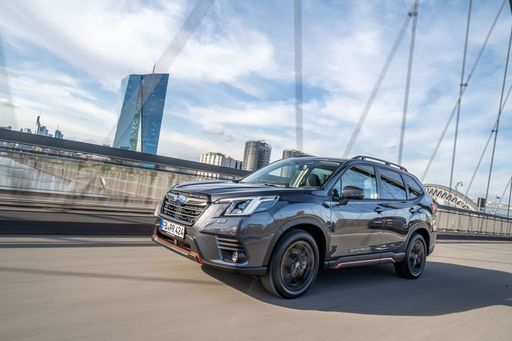 @ Subaru
@ Subaru
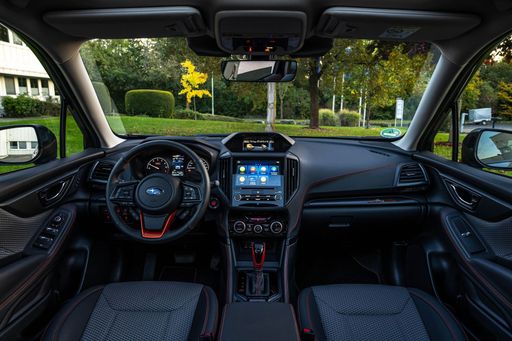 @ Subaru
@ Subaru
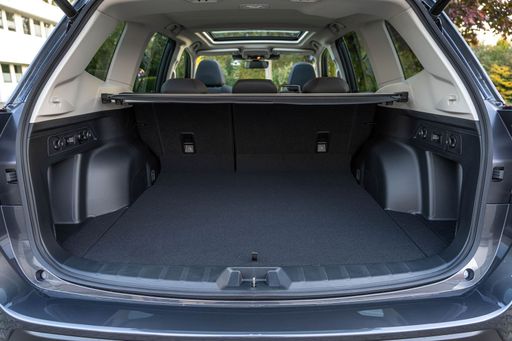 @ Subaru
@ Subaru
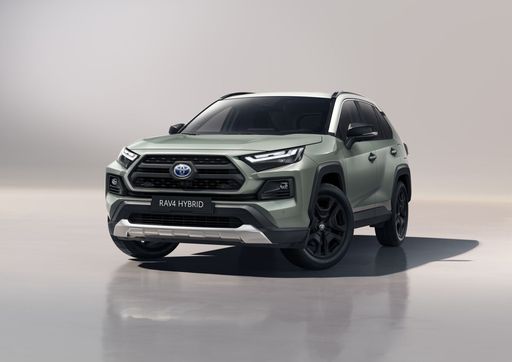 @ Toyota
@ Toyota
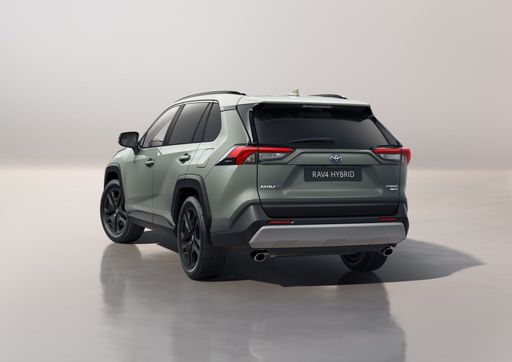 @ Toyota
@ Toyota
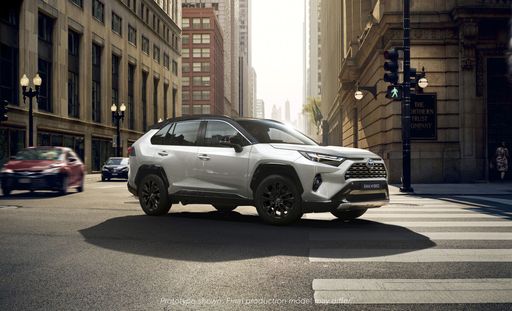 @ Toyota
@ Toyota
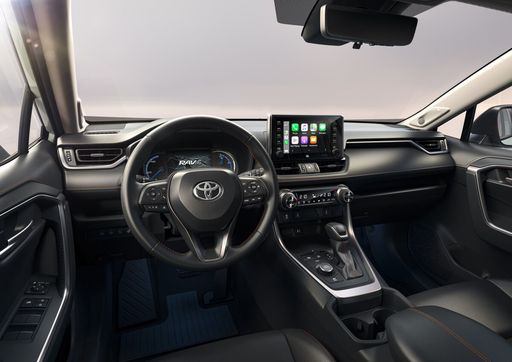 @ Toyota
@ Toyota

|

|
|
|
|
Costs and Consumption |
|
|---|---|
|
Price
about 34900 - 42900
$
|
Price
about 37900 - 54300
$
|
|
Consumption L/100km
8.1
L
|
Consumption L/100km
1 - 5.6
L
|
|
Consumption kWh/100km
-
|
Consumption kWh/100km
-
|
|
Electric Range
-
|
Electric Range
75
km
|
|
Battery Capacity
0.6
kWh
|
Battery Capacity
-
|
|
co2
185
g/km
|
co2
22 - 128
g/km
|
|
Fuel tank capacity
48
L
|
Fuel tank capacity
55
L
|
Dimensions and Body |
|
|
Body Type
SUV
|
Body Type
SUV
|
|
Seats
5
|
Seats
5
|
|
Doors
5
|
Doors
5
|
|
Curb weight
1658 - 1693
kg
|
Curb weight
1745 - 1910
kg
|
|
Trunk capacity
509
L
|
Trunk capacity
520 - 580
L
|
|
Length
4640
mm
|
Length
4600
mm
|
|
Width
1815
mm
|
Width
1855
mm
|
|
Height
1730
mm
|
Height
1685
mm
|
|
Payload
492 - 527
kg
|
Payload
390 - 600
kg
|
Engine and Performance |
|
|
Engine Type
Petrol MHEV
|
Engine Type
Full Hybrid, Plugin Hybrid
|
|
Transmission
Automatic
|
Transmission
Automatic
|
|
Transmission Detail
CVT
|
Transmission Detail
CVT
|
|
Drive Type
All-Wheel Drive
|
Drive Type
Front-Wheel Drive, All-Wheel Drive
|
|
Power HP
150
HP
|
Power HP
218 - 306
HP
|
|
Acceleration 0-100km/h
11.8
s
|
Acceleration 0-100km/h
6 - 8.4
s
|
|
Max Speed
188
km/h
|
Max Speed
180
km/h
|
|
Torque
194
Nm
|
Torque
-
|
|
Number of Cylinders
4
|
Number of Cylinders
4
|
|
Power kW
110
kW
|
Power kW
160 - 225
kW
|
|
Engine capacity
1995
cm3
|
Engine capacity
2487
cm3
|
|
Top speed
188
km/h
|
Top speed
180
km/h
|
General |
|
|
Model Year
2021 - 2024
|
Model Year
2020 - 2024
|
|
CO2 Efficiency Class
G
|
CO2 Efficiency Class
D, B
|
|
Brand
Subaru
|
Brand
Toyota
|
Subaru Forester
The Subaru Forester: A Staple of Innovation
The Subaru Forester continues to stand out as a robust and reliable choice in the SUV market. Known for its rugged capabilities and thoughtful design, the Forester combines traditional Subaru strengths with modern technological innovations. As an all-wheel-drive vehicle, it promises safety, efficiency, and performance in a dynamic package.
Engineering and Performance
At the heart of the Subaru Forester lies its 2.0-litre petrol mild-hybrid engine, delivering a stout 150 PS and 194 Nm of torque. This power is channelled through an advanced CVT gearbox, ensuring smooth and responsive acceleration. The vehicle can sprint from 0 to 100 km/h in approximately 11.8 seconds, showing its agility despite its SUV stature.
One of the highlights is its all-wheel-drive system, designed to offer excellent traction and stability across diverse driving conditions. The Forester provides a top speed of 188 km/h, ensuring an exciting drive whether you're navigating city streets or venturing onto the open road.
Technical Specifications
The Forester maintains a balance between practicality and efficiency. With a fuel consumption rate of 8.1 L/100km and CO2 emissions positioned at 185 g/km, this SUV provides an efficient yet powerful performance. The mild-hybrid system is supported by a 0.6 kWh battery, offering enhanced fuel economy and reducing environmental impact.
Weighing between 1658 and 1693 kg, the Forester is designed to offer both robustness and fuel efficiency. It boasts a generous cargo capacity of 509 litres, perfect for both daily use and adventurous getaways. The exterior dimensions—4640 mm in length, 1815 mm in width, and 1730 mm in height—strike a balance between presence and manoeuvrability.
Design and Interior Features
With a sleek and modern design, the Forester is available in several trims catering to different customer preferences, such as the Trend Lineartronic, Active Lineartronic, and the luxurious Edition Exclusive Cross Lineartronic. The interior space is noteworthy, providing comfortable seating for five passengers, making it an excellent option for family journeys.
Safety and convenience are paramount in the Forester, featuring driver assistance systems designed to support and protect. The model comes equipped with state-of-the-art technology to keep occupants entertained and connected, enhancing the driving experience significantly.
Affordability and Running Costs
Price-wise, the Subaru Forester ranges from €37,790 to €46,450, aligning with its features and capabilities. The monthly costs for ownership may vary between €1125 and €1221, with costs per kilometre ranging from 45 to 48.9 cents. For those seeking an SUV that's a combination of comfort, reliability, and reasonable running costs, the Forester presents a persuasive choice.
Conclusion
The Subaru Forester remains a solid contender in the SUV segment, offering a mix of performance, practicality, and modern features. This vehicle is engineered for those who desire a dependable and versatile companion for all their adventures. With its blend of innovative technologies and classic Subaru reliability, the Forester continues to be an attractive option for discerning drivers.
Toyota RAV4
The Toyota RAV4: A Modern Marvel in the SUV Segment
The Toyota RAV4 has long been a staple in the SUV market, renowned for its reliable performance and innovative design. In the latest iterations, Toyota continues to build on this legacy by integrating advanced technology and superior engineering.
Hybrid Excellence: Under the Hood
The latest RAV4 models are equipped with impressive hybrid engines, offering both full-hybrid and plug-in hybrid options. The performance spectrum ranges from 218 to a staggering 306 PS, providing power without compromising efficiency. These engines are paired with a responsive CVT automatic transmission, delivering a smooth driving experience.
The hybrid variants achieve remarkable fuel efficiency, with consumption rates as low as 1.0 to 5.6 litres per 100 kilometres, depending on the model. Additionally, the plug-in hybrid versions boast an impressive electric-only range of up to 75 kilometres.
Performance Meets Practicality
The Toyota RAV4 is not just about power; it also offers practical features that enhance the driving experience. With a top speed of up to 180 km/h and a rapid acceleration capability of 0-100 km/h in just 6 to 8.4 seconds, it combines the thrill of driving with everyday usability.
The spacious interior comfortably seats five, with a generous boot capacity ranging from 520 to 580 litres, making it ideal for family adventures or long road trips.
Innovative Driving Dynamics
One of the RAV4's standout features is its driving dynamics. Available in both front-wheel and all-wheel drive, the all-wheel drive variants, branded as AWD-i, offer enhanced traction and stability, providing peace of mind in various driving conditions.
Furthermore, Toyota has ensured that the RAV4 caters to diverse tastes and preferences, with several trim levels like the Adventure AWD-i, Business Edition, and the sporty GR SPORT AWD-i, offering unique features and styling options.
Eco-Friendly and Cost Effective
Environmental considerations are central to the RAV4 design philosophy. The model range adheres to strict CO2 emission standards, rated between 22 and 128 g/km, placing it in the B to D CO2 efficiency classes.
Moreover, the running costs of the RAV4 reflect its excellent efficiency, with monthly expenses ranging from €1,068 to €1,315, and cost per kilometre between 42.7 and 52.6 cents, making it a sensible choice for eco-conscious drivers.
Conclusion: The RAV4's Unmatched Appeal
Whether you're a city driver or an adventure seeker, the Toyota RAV4 offers a perfect blend of power, efficiency, and practicality. Its state-of-the-art hybrid technology, coupled with its versatile features, truly sets it apart in the competitive SUV market. With the Toyota RAV4, drivers experience the best of both worlds: exceptional performance and eco-friendly innovation.
